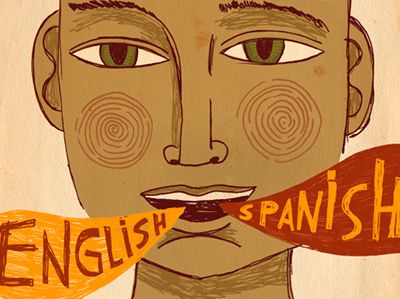
It’s almost the start of the new school year for some, and maybe your kids will be taking Spanish class (or maybe they’re in a language immersion program, lucky you!). Or perhaps your kids aren’t taking any language classes, but you speak Spanish at home and are raising them bilingually. The benefits of being bilingual are phenomenal, as a quick google search will reveal. In case you need a refresher (or just want to have them all in one place to refer to when your kid [or you] needs a pep talk), this post is for you!
I e-met Sara a few months ago and loved her immediately. She’s a lawyer and fellow book-loving mami (and Sol Book Box subscriber!) who is raising her two kids trilingually (!) as English/Spanish/Slovak speakers. On her blog she shares some amazing resources for anyone raising kids multilingually, and kindly compiled a list to share here of all the ways being bilingual or multilingual will benefit your kids—read on (and maybe pat yourself on the back for giving this gift to your niños)!
Sara says:
Raising bilingual or trilingual children is incredibly easy — for the kids. Both my husband and I were lucky enough to be raised bilingually (in my case) and trilingually (in his). We thought memories of our childhoods — happy, carefree — reflected how easy it would be to raise children with multiple languages. And well, we were wrong (just as we were wrong about a lot of our other ideas surrounding parenthood, because “sleep like a baby” means they sleep a lot, right?).
Most sources I’ve found suggest that exposing your children to the target language at least 30% of their waking time is sufficient for them to learn. Though that seems like an easy threshold to meet, between school, play dates, and other activities where they are mainly exposed to English, I often get antsy that their Spanish and Slovak will suffer. For kids in the U.S., like ours, English is so easy — everyone at the park and at school speaks it, most of the books in the library or at the bookstore use it, and it’s the default for most movies, shows, songs, and videos they’re exposed to.
Though it can be difficult to maintain, the benefits of being multilingual are well-documented. And reviewing them always gives me a boost in morale. All the times I respond “que?” in feigned ignorance when my son speaks English to me will pay off (I tell myself as I Google for the hundredth time how to say raccoon or moose or snowplow in Spanish)! So for my benefit, and maybe for yours too, here’s a short list of all the ways being bilingual or multilingual will benefit your children:
- It literally rewires their brains. Multilinguals “have greater brain tissue density in the areas of the brain related to language, memory, and attention.”
- Bilingualism may ward off cognitive deterioration and dementia.
- It makes people more empathetic.
- Multilingual children have greater executive control than monolingual children, which is associated with the ability to plan, control impulses, memory recollection, and focus on tasks (and may make them smarter).
- They may be happier in school and exhibit fewer behavioral problems.
- Multilingualism is associated with high academic achievement and better mental health status.
- There is a growing demand for multilingual workers in the workforce.
- Infants raised in bilingual (and presumably multilingual) environments demonstrate cognitive benefits at a younger age than previously thought, which translates to higher executive function.
- Interestingly, though not necessarily a benefit, bilingual people experience time differently than monolingual people.
- And most importantly, our children have the added luxury of being able to communicate with their grandparents, other relatives and entire other countries in their native languages, allowing for deeper familial and cultural bonds. Our experience is further supported by several studies, which have shown that “children who speak their parents’ heritage language enjoy better relationships with their families and are less likely to be alienated from them.”
You get the point.
A lot of times it feels like we’re in this alone, but the more I speak with others who are also attempting to raise (or have already raised) multilingual children, the more it feels like it’s possible.
—
Thank you so much, Sara! My kids are still really little, but I love having all of this academically-supported motivation in my pocket for the days when it feels like everyone in the world (their little world, at least) is speaking English except us!
What do you think, dear readers of this blog? Have you experienced some of the benefits of this list and/or seen them in your kids?
A version of this post appeared on Sara’s blog http://www.onedostres.com in March 2017.
